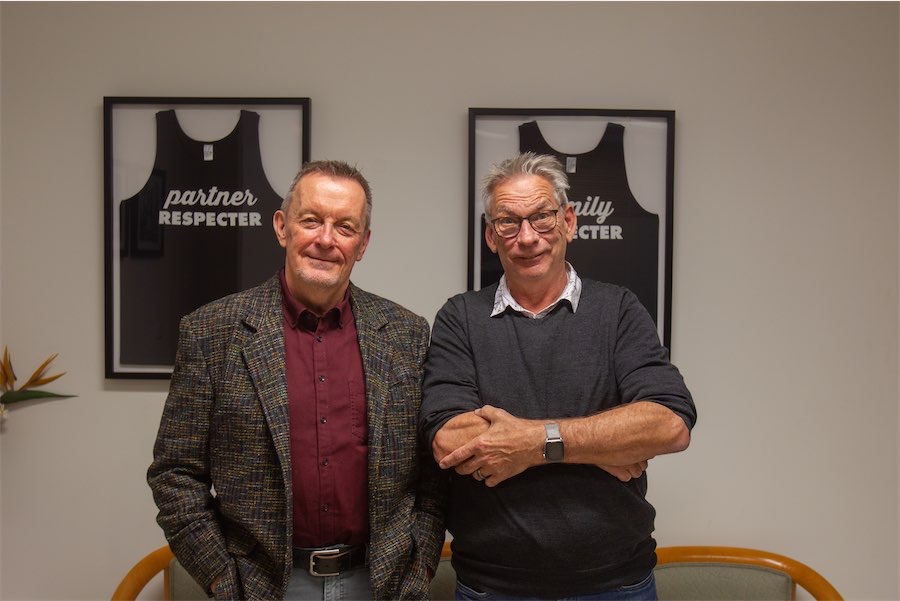
Australia is in the midst of a domestic and family violence crisis, and statistically, men are overwhelmingly the perpetrators.
Greg Aldridge, CEO and founder of EveryMan, and Simon Port, violence prevention services manager, are doing their best to tackle this through their Working With the Man program, a specialist, behavioural-change program for male perpetrators of violence against women.
Starting out in 1992 as a fortnightly men’s group, EveryMan has evolved into a community service organisation for men who present with high and complex support needs, says Greg.
“We’ve always worked predominantly with the guys who are at the pointy end of the support scale, and they’re often the guys who would get pushed out of organisations’ support services if they swore too much or if they yelled or got angry,” says Greg.
Simon and Greg say their work is addressing a key factor in why violence continues, and while it is challenging, they are encouraged by the number of men coming to them as self-referrals.
“They’re recognising at that point that their behaviour is impacting the people that they care for,” says Simon.
“They recognise that it’s damaging the relationship, that it’s not sustainable.”
Both Greg and Simon attribute this to a greater awareness of the means and use of violence, particularly increased understanding of coercive control.
“I think you could probably say that the reporting of domestic violence has changed and that’s had an impact on awareness in the community because the way that it’s talked about in the media has shifted,” says Greg.
“But I think there’s always a proportion of the community that just doesn’t want to hear it, because they’ve got some pre-existing set of beliefs or attitudes that, you know, when they hear it they just switch off, and so they minimise a lot of it.
“I think the other side of it is, that even though there’s more awareness, the awareness doesn’t seem to be impacting the rate of domestic violence.
“So whoever’s become more aware, they’re not necessarily the people who are going to commit acts of violence.
“And even then, you could probably assume that some people who are aware are also still at risk of using violence, because when you’re in the situation where it’s escalating and the person acts out, they’re not thinking about what they read in the paper.
“The triggers to violence don’t have a lot to do with conscious reflection.”
Simon and Greg say a long-form campaign outlining what domestic and family violence can start as, and how it evolves, is necessary in tackling the epidemic, as is dedicated funding to services for perpetrators.
“In some ways the expectation that everything can be solved by men talking to men is a pipe dream,” says Greg.
“Some men will be influenced by what other men say to them, but what about all the men out there who aren’t surrounded by men who are having those conversations?
“You can’t abdicate responsibility for pushing the messages out there that will make a difference by expecting individual men to do what the government isn’t willing to do, which is design a long-term and effective campaign.”
“A lot of men don’t understand that some of their behaviours sit under that domestic and family violence space,” says Simon.
“They just see it as a normal behaviour that men do.”
Simon acknowledges funding is needed in lots of different areas to tackle the domestic and family violence epidemic, but says the problem cannot be fixed without the proper funding of services dedicated specifically to working with the perpetrators.
Greg says that 50 of the 70 people on the counselling waiting list are there because they were referred over domestic violence matters, and despite it being the most popular reason for referrals, EveryMan does not get counselling funding for domestic violence.
There are also the specialised violence prevention programs waiting lists, which Simon says has about 120 people on it.
“We’re working here with the men who are using violence, and we are absolutely at overcapacity,” Simon says.
“We just don’t have the means to be able to support the men that are actually identifying they want support.”
“One of the reasons I think that men’s behaviour change programs aren’t adequately resourced is that the government really hasn’t come to terms with how to think about men with complex issues,” says Greg.
“Just because these men have used violence previously doesn’t mean they don’t have feelings and values and aspirations to be a better man,” says Simon.
EveryMan, 20 Genge Street, Civic. Call 6230 6999 or visit everyman.org.au
Who can be trusted?
In a world of spin and confusion, there’s never been a more important time to support independent journalism in Canberra.
If you trust our work online and want to enforce the power of independent voices, I invite you to make a small contribution.
Every dollar of support is invested back into our journalism to help keep citynews.com.au strong and free.
Thank you,
Ian Meikle, editor




Leave a Reply